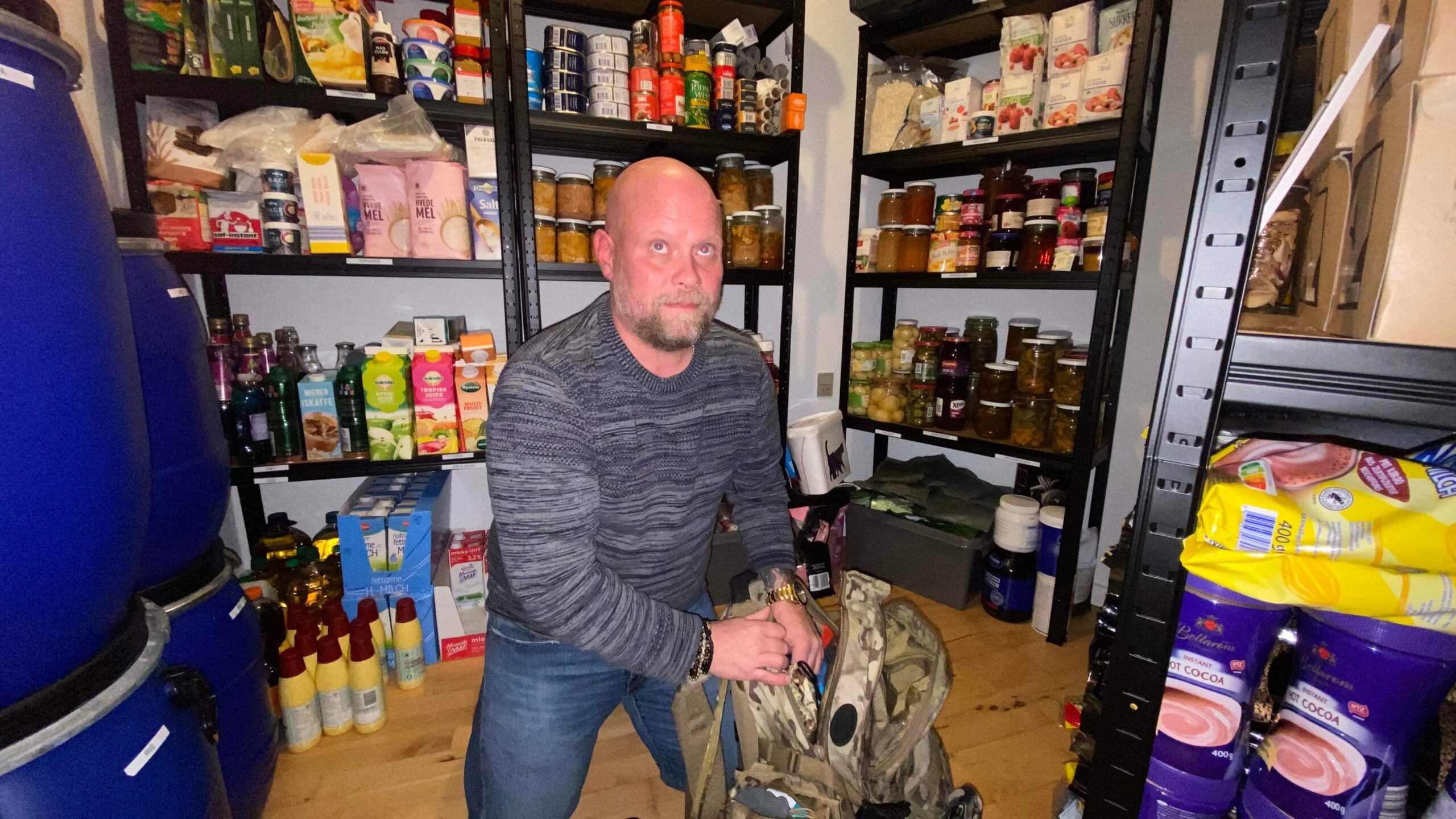By Thea Charlotte Landsverk and Andrine Gald Myklebust
We all prepare ourselves to some extent. We stack up on foods before a weekend at the cabin and we buy our New Years Eve turkey days in advance. For some people preparation becomes all-consuming. “Preppers” strive to be ready for the unthinkable. However; is it really that unthinkable?
Alongside meters of light chains
Decorated houses, luminous reindeers and frosty roads, that is what you will encounter if you go for a 20-minute drive from the city of Silkeborg. It is clear that people are preparing for the big upcoming holiday. For Rolf Jensen, Christmas is not the only thing worth preparing for.
Rolf Jensen is like any other man in the neighbourhood. From the outside, he seems to be living the normal everyday life in company with his girlfriend and their cat, Theodor. His house is decorated to the smallest detail. Nothing is coincidental. But Rolf is not only prepared for the upcoming holiday season, he is prepared for just about everything.
Inside the overly Christmas-decorated house, hides more than Christmas trees and jingle bell rock. Canned food, bulletproof vests and vacuum containers are all part of his everyday lifestyle: prepping.
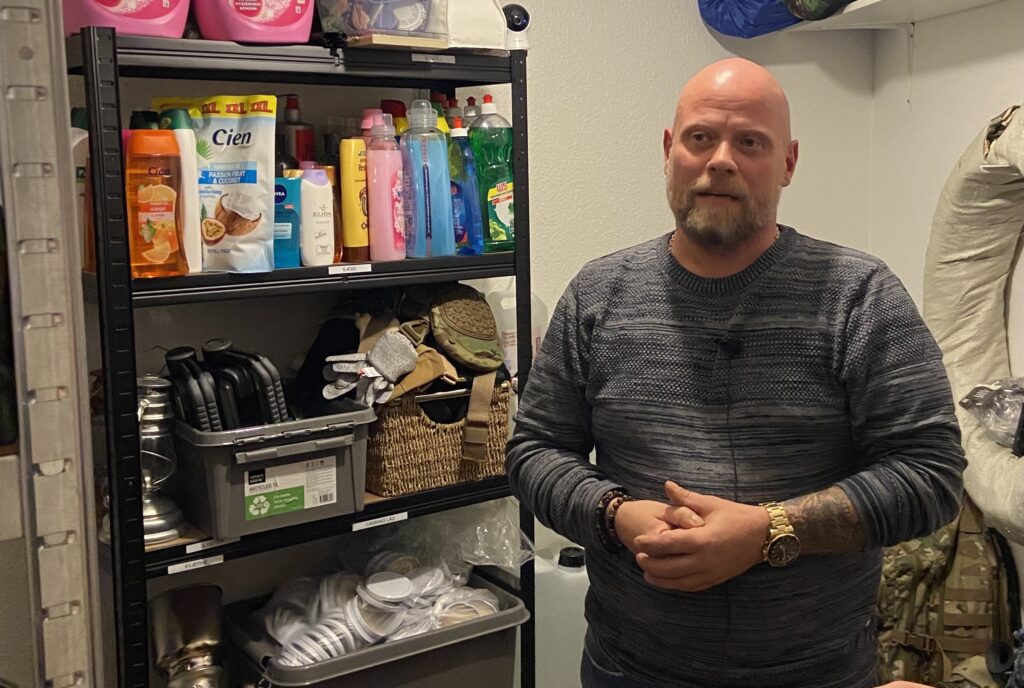
The word “prepper” means preparing and refers to a person who prepares for a catastrophe or emergencies. The word became well known when people, especially across the U.S, began preparing for doomsday; a phenomenon also referred to as survivalism.
Despite prepping being a relatively new term; according to New York Times author Diane Capri´s book on the history of preppers, the concept has existed for decades and can be traced back to the start of the Cold War. However, the concept was especially given attention after the 9/11 terrorist attack. People made emergency strategies and began to stack up on necessary supplies as the attack had implied the importance of being prepared.
In more recent years, the term has been associated with so-called “doomsday preppers”. As the term implies, people who, on an extreme level, prepare for doomsday. In 2011, a reality tv show of the same name became popular and has made prepping closely associated with basement bunkers and underground silos.
Becoming a trend?
The phenomenon made its way to Europe. In Denmark there has been a significant increase in hobby-level prepping the past year. Facebook groups have seen extreme increases in member numbers, according to their administrators.
It is becoming an increasingly popular hobby, but that was not the case 15 years ago. Jensen tells us how his first 3 years of his prepping was merely talking and discussing with the few people he knew who started prepping at the same time as he did.
“About 10-12 years ago, a Danish preppers forum was established. It became a meeting place for all the initial preppers, and I am still in contact with many of the people I learned to know through this forum” he explains
Jensen continues to tell us how the preppers expanded their network until the forum had a couple thousand members.
“After some years in the forum, Facebook invented it´s groups function. I guess it was around 7-9 years ago when the first preppers group was made, however we were very few members at the time”
After the covid pandemic made its way to Denmark, two facebook groups were active with around a total of 3-4000 members, many people being present in both groups.
In September 2020 the Danish broadcasting DR released a documentary about preppers in Denmark, 7 months into the pandemic. Rolf was one of the preppers interviewed.
“This drastically made an increase in memberships. I believe there is around 12 000 members in total now” he states.
Fear drives people to the shops
It is not only within Facebook groups that the war and the Covid19 pandemic have made an impact. Smaller and bigger outdoor and military stores have also felt the pressure from people wanting to prepare and provide their families with survival gear.
“Militærbutikken.dk ” is one of the many military stores that have seen an increase in sales during the pandemic and after the war in Ukraine. The Danish online shop can confirm that the sale of survival gear increased with over 50% during the Covid pandemic and the sale of gas masks rose by 1400%, especially after the invasion of Ukraine.
The current shopkeeper, Anders Peder Lykkegård, is well aware of the possible impact that the war has had for the sales in his store.
“Many people started purchasing bug-out-bags after the invasion of Ukraine and it seems that people have started to think of new ways to stay safe.”
“I think more people have started to worry now” says Lykkegård.
The shopkeeper himself saw a clear link between the increase in sales from the military shop and the current situation in the world. The trend of prepping and overall providing safety to one’s family has been more visible during the last couple months and years. Together with survival gear, the sale of iodine tablets exploded in Denmark in 2022. Numbers from “CPH Post” show that the online shop “Helsebixen.dk” sold over 600 packets of iodine pills on one Sunday alone.
Prepared for everything?
Back in Jensen´s house there is not only toilet paper that is being stored. As he opens the door to what has become his lifestyle and hobby room; tons of canned foods, water, heating equipment and vacuum containers become visible. The shelves are clean and structured and reflect his time and effort. Jensen explains how he uses restocks the food to make sure it does not go to waste.
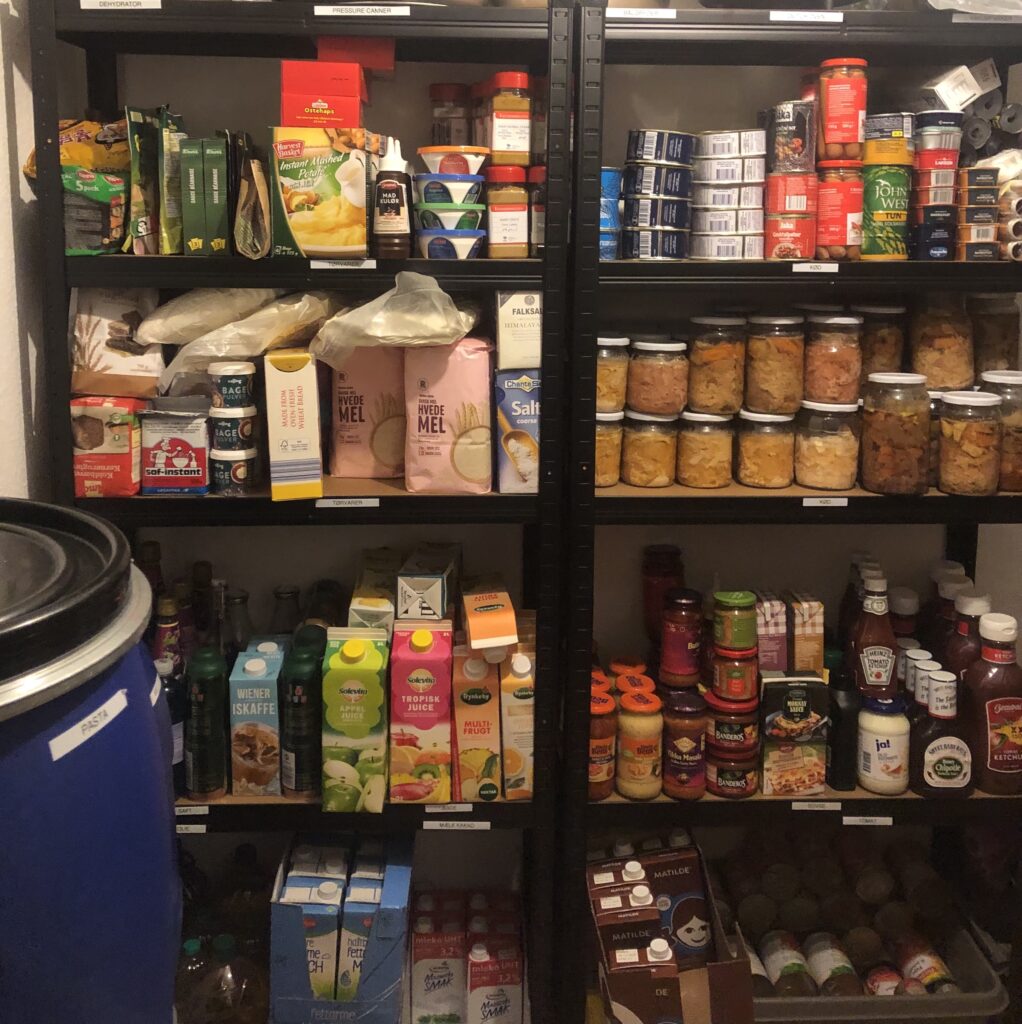
“Although there is a lot of food and supply in here, I make sure it is food that I normally use. It´s not like I throw everything out every 10 years” he says
He tells us how the vaccum containers and jars are used to make sure the food lasts longer.
In the corner there is a rack filled with camouflage gear, bulletproof vests and two so-called “bug out bags”.
“If something happens, I need to be able to get to one of my bunkers without being visible to other people. The bags are packed, so that we can leave quickly and easily.”
The bug-out bag is a well known must have for most preppers. The bag contains necessities for survival for 3-4 days.
“You can think of it as the miniature version of this storage room. I have everything i need, but for fewer days and in smaller sizes.”
Rolf´s interest has grown from his interest in outdoor living. He explains that the essence of prepping is the same as that of outdoor living; you prepare for difficult situations.
Nevertheless, the supply in Jensen´s house imply that he is not only prepared for a war to break out; his household may survive catastrophes of a widely different nature.
“I have everything from Iodine tablets and thermal Binoculars to bulletproof vest.”
There is especially one thing that sticks out in the room. A wheel-shaped ball wrapped in hard plastic.
“The reason most preppers want to stay anonymous is the risk of people intruding their house if crisis occurs. If people are hungry and desperate, there is no limit to their acts in order to survive” says Jensen when explaining why he keeps 300 meters of spiked fence in his storage room.
He says that the fence would be used to protect his home, his family and most importantly his storage room if anything was to happen.
Jensen´s storage room holds enough supply to survive for day, weeks and probably months in most crisis.
“I am prepared for anything, however I do believe there is a likelihood that we´ll experience an attack on power towers, the internet and electricity.”
Most of us associate prepping with storage rooms or bunkers full of supplies and gear to survive doomsday or war. But what do preppers do to prepare for cyber-attacks?
“If our internet or electricity is taken down, we won’t be able to buy groceries or heat up pur homes. In addition to food and water i keep cash, radios and powerless heating” says Jensen
He shows us several heaters and ways to make food without electricity. He points towards one of them when we ask what he recommends non-preppers to keep in their house.
“Heating is important. I keep heaters for my house, but I also have different lighter steels and cottonballs in both of my bug out bags in order to make a bonfire.”
Rasmus Dahlberg, professor at the Institute of strategy and war studies, explains that threats towards Denmark today, according to the Zilmer-rapport, includes heading towards a new cold war and facing natural disasters. However, cyberattacks towards our digitalised societies is amongst the greatest ones.
When asking Dahlberg what we can do on a national level his answer is clear:
“I think in order to prepare, we should build firewalls instead of concrete walls.”
Outdoor living and prepping – goes hand in hand?
“Be prepared” is a well-known phrase in the Danish scout troops; the place where David interest for a different kind of prepping has its roots.
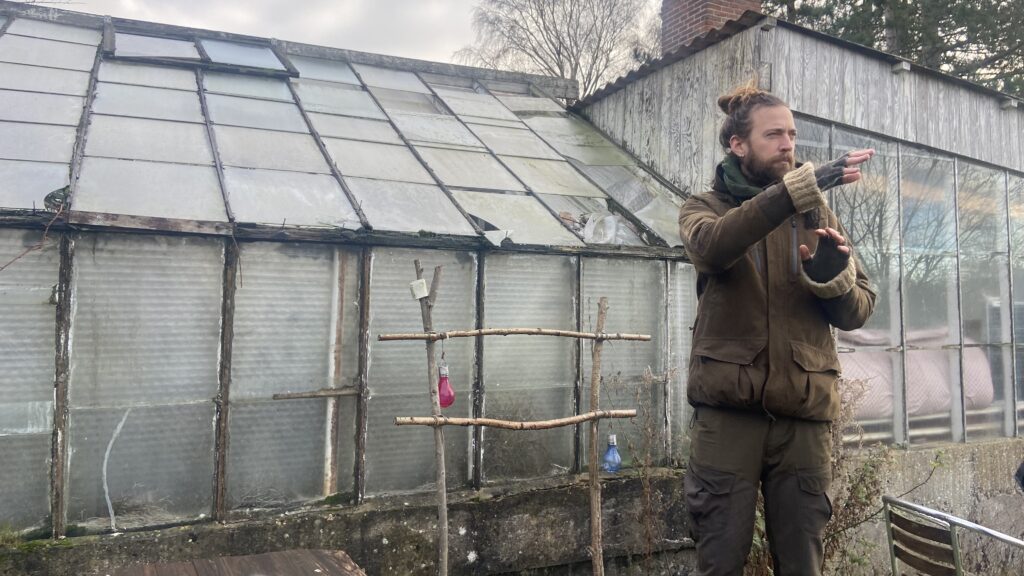
In an old Orchid farm outside the center of Aarhus, David Hansen, a junior high school teacher from Aarhus, sees prepping in a different way; David learns and maintains his outdoor and survival skills. In contrast to the typical preppers, David sees prepping as merely skills that can be acquired. The latter being David´s main motivation to create a youth class where prepping was the topic.
“I think prepping in my case is more about skills and planning, then it is stacking up on materials and goods. There are many critical situations in which food and water may not be sufficient resources in itself.”
Prepping may be associated with outdoor and survival skills. There are different types of preppers which may not necessarily mean someone prepping for doomsday, keeping a bunker full of food and equipment, but rather someone able to survive on natural resources for a longer period.
“I think planting Jerusalem Artichoke is my best prepping hack; you can leave it during the winter, it spreads and it’s even more healthy than potatoes!”
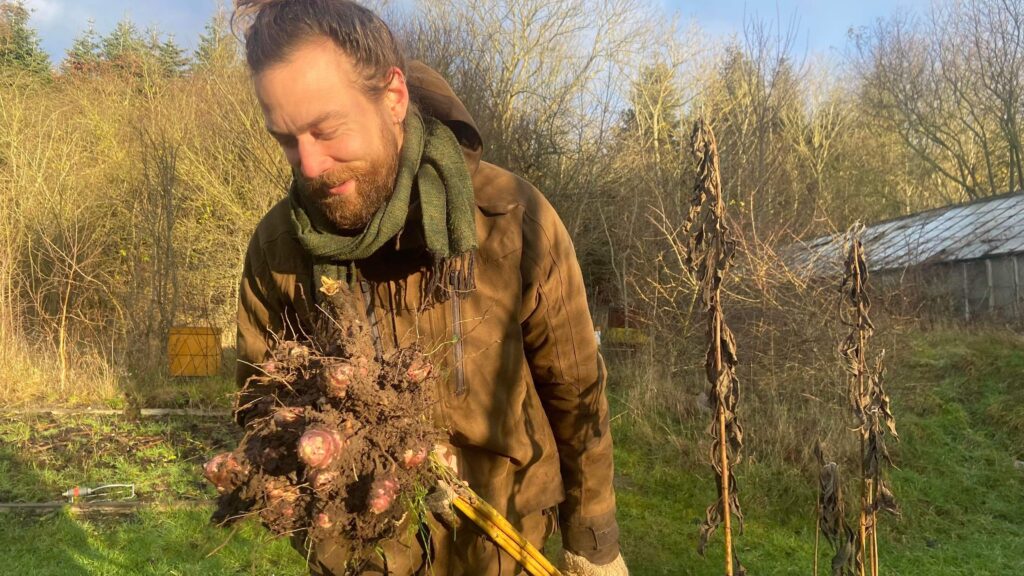
The orchid farm has now been equipped with bow and arrow training gear, foodplants, bonfire place and honeybeeboxes. He explains that it is his interest for it that drives him, not merely the ability to be prepared. As a hunter, he has added to his survival skills by learning different ways to make a bonfire, making animal traps, as well as sleeping and staying warm outside.
“I could be stranded on a desert island and probably survive for some time” he smiles.
Last year, David started a preppers class for his students in junior high school. The course concerned learning abilities to survive in the wild, as well as making a “bug out- plan”. The course implied a doomsday-night; letting the kids learn how to act if they were put in an unfamiliar situation, requiring several plans of escaping, and surviving.
“I believe knowledge, and the ability to teach and be taught different ways of living in the nature will get you further than locking yourself in a room full of canned foods.”
“Although the material things will give you necessities to stay alive, it may also take away your living.”
David agrees that being prepared in some ways is beneficial, however he has some thoughts about stacking up on materials and supplies to survive.
“Denmark is such a small country, and I believe that if a war was to happen, a bunker would be found at some point. Norway for example, has mountains where you could probably hide for decades, thats not the situation here.”
Reflecting on the war in Ukraine David explains his thoughts about being exposed to war as a prepper.
“The likelihood that I would leave the country is quite big, and so having a storage room would not help me much in that situation. Skills as to how to survive on the other hand, can never be taken away from you”
Although he sees a motivation in being prepared for a catastrophe, David admits that keeping his survival skills maintained is merely driven by his interest in outdoor living. He emphasizes the importance of keeping it at a hobby level without being anxious or fearful about it.
“I think if you feed into prepping too much, it may become anxiety. Although it’s always good to be prepared to some extent, I think it’s important to live in the now and not let the fear of catastrophe become your life.”
National Preparation
Preparing on a national level seems to vary greatly within the European countries. Even within Scandinavia there are great gaps between the countries in how they approach and communicate their emergency plan. In Sweden, the government has made sure that every citizen is aware of what they think every household should keep; water, canned foods, heat and radio amongst the recommendations. In Norway the list also contains Iodine Tablets which should be taken if a nuclear attack occurred. Danmark, however, does not have a list of recommendations for it´s citizens.
“Amoung the reasons is the fact that Denmark geographically differs from Norway and Sweden with regards to their proximity to Russia.”
In addition, Professor Dahlberg explains that Denmark has an efficient sector responsibility principal. The responsibility therefore lies within multiple institutions; police, municipality, healthcare and emergency. Making one list would be “a hearing from hell”.
He considers that Denmark has a strong emergency plan and that the society is based on trust between government and citizens.
“If anything was to happen, we will be alright.”
An act of fear and exaggeration?
Further Dahlberg believes that we cannot divide our society into preppers and non-preppers and that we should see it as a scale. He reflects on the fact that we distinguish from other animals because we understand the term “risk” and that we all prepare to some extent.
After the covid19 pandemic spread its way throughout the world, people went into panic mode. Denmark’s Prime Minister, Mette Frederiksen held a press conference encouraging people to “not run to the stores to buy toilet paper and yeast”. The days after that’s what people did, emptying the shelves for exactly toilet paper and yeast.
“Most household stack up before easter holiday, to prepare for the supermarkets to close. That is prepping as well, isn’t it?” says Dahlberg
Similar to Dahlberg and Hansen, we may think that preppers spend their life preparing for something that may not happen, and so they are not living whilst they can. To some extent that may be true. Nevertheless, there are many kinds of strange and abnormal hobbies out there.
Many of us spend, or have at some point in our lives spent a lot of time and money on our hobbies. Some hobbies include football, hours of watching it, money spent on traveling to see it, betting on it, stacking up on football shirts and hundreds of pints of beer. We all have our preferred ways of living, and that is life after all.
We all prepare to some extent in our everyday lives. As evident by the covid 19 pandemic, many of us start prepping when it’s already too late; when the crisis has hit. So maybe prepping is the future for us all?
“Fanaticism is when you double the effort after forgetting the goal. If the purpose of prepping is to be prepared to save your life when disaster hits, it seems ironic to use your entire life sitting in a bunker and waiting, maybe even in vain” says Dahlberg
Although preppers don’t necessarily wait in their bunker, there seems to be so much time and effort put into their prepping lifestyle, which could have been used for living instead.
“If i did not do prepping as a hobby, i would still be prepping in one way or another, it has become my preferred way of living.” Jensen concludes.

